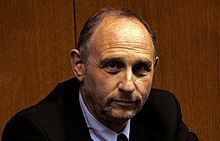
Summary
Yuri Stern (Hebrew: יורי שטרן, Russian: Юрий Штерн, romanized: Yuriy Shtern, 29 March 1949 – 16 January 2007) was a Russian-Israeli politician and journalist. He was a member of the Knesset from 1996 until his death, first as a member of Yisrael BaAliyah and later on behalf of Yisrael Beiteinu.[1]
Yuri Stern | |
|---|---|
 | |
| Faction represented in the Knesset | |
| 1996–1999 | Yisrael BaAliyah |
| 1999 | Aliyah |
| 1999–2003 | Yisrael Beiteinu |
| 2003–2006 | National Union |
| 2006–2007 | Yisrael Beiteinu |
| Personal details | |
| Born | 29 March 1949 Moscow, Soviet Union |
| Died | 16 January 2007 (aged 57) |
Background edit
Born in Moscow, Stern was active in promoting Jewish immigration from the Soviet Union. He emigrated to Israel in 1981. He had a PhD in economics from Moscow University.[2]
Political career edit
Stern was first elected to the Knesset in the 1996 elections on the list of Yisrael BaAliyah, a Russian immigrant party. However, after internal disagreements within the party he broke away with Michael Nudelman to form a new party, Aliyah.
For the 1999 elections, Aliyah ran together with Yisrael Beiteinu, another Russian immigrant party, with Stern retaining his seat. Aliyah was soon merged into Yisrael Beiteinu and ceased to exist.
After Ariel Sharon beat Ehud Barak in a special election for Prime Minister in 2001, Yisrael Beiteinu was added to Sharon's coalition government and Stern was appointed Deputy Minister in the Ministry in the Prime Minister's Office.
He retained his seat again in the 2003 elections, in which Yisrael Beiteinu ran as part of the National Union alliance. He was re-elected in the 2006 elections in second place on Yisrael Beiteinu's list (the party ran alone in the election).[3]
Whilst a Knesset Member, Stern served as chairman in two Knesset committees; the Internal Affairs and the Environment Committee, and the State Inspection Committee. He was also chairman of two Knesset lobbies; the Knesset Christian Allies Caucus, which he helped form, and the Knesset Forum on the Middle East.
He also wrote several articles for newspapers including The Wall Street Journal, The Jerusalem Post, and Ma'ariv, as well as several academic papers on economics of the USSR.
Stern was also a member of several other organisations, including the Zionist Forum (within of which he was a member of the management for the Israeli Zionist Forum), and others mostly related to immigration and immigrant absorption. He was a vehement opponent of land surrender to Palestinian Authority.[4]
Stern died of cancer on January 16, 2007. The Yuri Shtern Holist Center was created in his memory which helps cancer patients.[5] The Yuri Stern Prize for the Arts is awarded every year.[6] A street was named after him in Jerusalem[7] and a monument was created in Dimona.
References edit
- ^ "Yuri Shtern". knesset.gov.il. Retrieved 2018-12-19.
- ^ "Knesset Member Yuri Stern Dead at 58". Israel National News. 16 January 2007. Retrieved 2018-12-19.
- ^ "Yuri Stern". www.jewishvirtuallibrary.org. Retrieved 2018-12-19.
- ^ "Pressure From The Right". Israel National News. 26 October 2001. Retrieved 2018-12-19.
- ^ שטרן, המרכז לסיוע הוליסטי ע״ש יורי (2018-12-18). "בית". המרכז לסיוע הוליסטי ע״ש יורי שטרן (in Hebrew). Retrieved 2018-12-19.
- ^ "Rivlin meets with winners of arts prize - Israel News - Jerusalem Post". The Jerusalem Post | Jpost.com. Retrieved 2018-12-19.
- ^ "רחוב בירושלים - על שם יורי שטרן ז"ל". ערוץ 7 (in Hebrew). 18 October 2012. Retrieved 2018-12-19.
External links edit
- Yuri Stern on the Knesset website
- Yuri Stern's memorial web site
- Legacy of integration Haaretz, 25 January 2007


